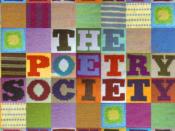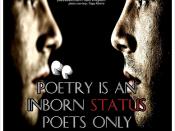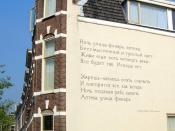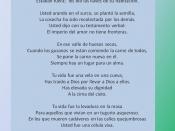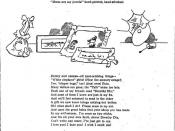The Creed A Creed is an accepted system or statement of religious beliefs. This poem is supposedly that but on further investigation you discover that really the author is poking fun at many belief systems, as is illustrated by his final line "We believe in the rejection of creeds"ÃÂ.
The poem The Creed has many repetitions of words or sets of words designed to influence certain points and to get the reader thinking. One example is the frequent use of the phrase "we believe"ÃÂ. This makes the poem a creed just as the title suggests. The amount it is repeated though makes you question whether the writer really believes what he is writing, as some lines are very sarcastic such as "We believe that after death comes The Nothing because when you ask the dead what happens, they say Nothing"ÃÂ. In the third stanza the word "evidence"ÃÂ is repeated three times.
The line "you can prove anything with evidence"ÃÂ mocks scientific minds that think that everything must and can be proved with evidence. In the second stanza, "we believe"ÃÂ is repeated so often that it is simple for the reader to see that the poet is being sarcastic.
Punctuation is used to draw the reader's attention to certain areas of the poem. Where it says "We believe that after death comes The Nothing because when you ask the dead what happens, they say Nothing"ÃÂ, you see that "The Nothing"ÃÂ is in capitals, making it a noun, seemingly very real and important. "Marxfreudanddarwin"ÃÂ includes 3 famous people's names, but by mixing them together only using one capital, the writer shows their insignificance in the overall scheme of life, although many people believe to the contrary.
Some sections of the poem conjure up images into your mind. It talks about how Americans should beat their guns into tractors and that the Russians would be sure to follow. Just thinking about this image makes you chuckle, seeing the Americans, who love their weapons so dearly, beating weapons into pieces of farm machinery. "We believe in horoscopes, UFO's and bent spoons"ÃÂ is another line that brings images off all those things into your mind and gets you thinking about them, and whether they really exist and have meaning.
There is a pattern of speech that the poem follows, that is one of almost a chant. If the whole poem were a chant though, you would not focus on any of the important points in the it, you would just read it over. Therefore the writer has created deliberate breaks in the pattern and rhythm where he wants you to take particular notice of points.
The poem The Creed has a sarcastic and ironic tone to it. It is very scathing of some beliefs people hold about society and religion. It mocks them through the use of sarcasm in such pieces as "They only differ on matters of creation sin heaven hell God and salvation"ÃÂ, surely the most basic questions and foundations of most religions. The poem is very thought provoking, using sarcasm to cause you to question ideas that many people believe in, making you think about whether the ideas are true or not. The poem is also quite humorous and informal which is going against its name as creeds are supposed to be formal and serious.
The writer is the persona of this poem. The poet makes the reader question society's beliefs while concurrently he appears to be questioning his own set of values. The issues he raises are; what religions and ideas are real or false, the logic of certain belief systems, and is there truly is a god? He is putting to you (the reader) the question of what do you believe, and letting you make up your own mind as to what you really believe.
This poem was designed to get peoples minds thinking about religion and generally about life. It is extremely thought provoking and controversial as it is tackling one of the biggest issues in the world (religion), which has caused many wars and hatred. The poem aims at getting a strong reaction from the reader; it doesn't matter whether it's positive or negative as long as there is a reaction. It succeeds.
